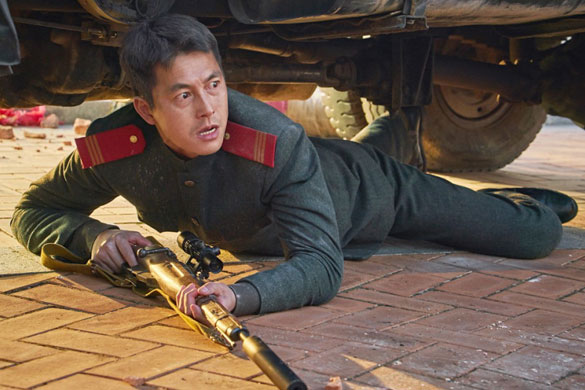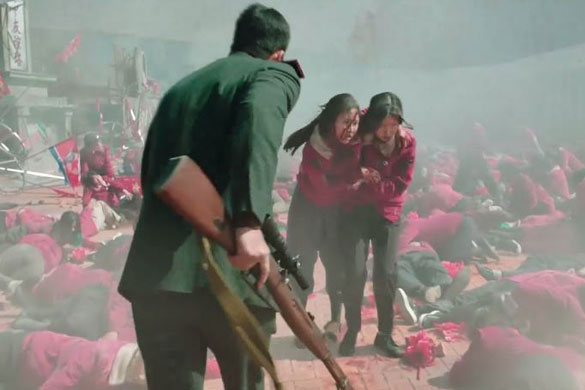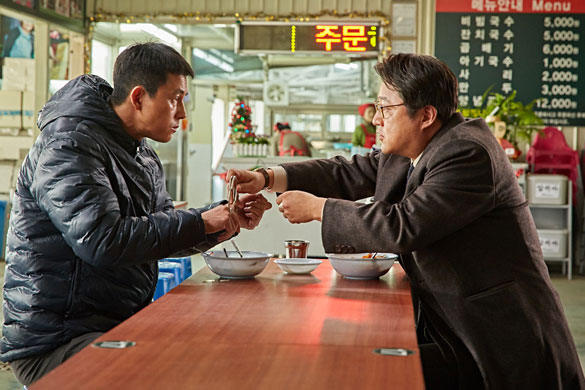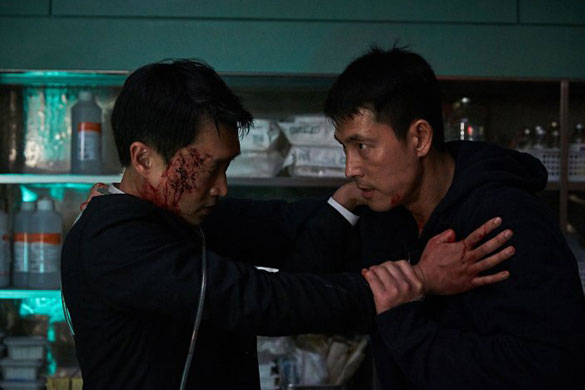
 |
||||
Um Cheol-woo (Jung Woo-sung) is a former North Korean military agent and spy. Coaxed out of 'retirement' by General Lee Tae-han (Kim Kap-soo), he is tasked with assassinating two high ranking individuals suspected of preparing to instigate a coup d’état in the North. Arriving in Kaesong - an economic zone largely serving Chinese businessmen - to carry out his furtive and dangerous mission, Um is unaware that the North's 'Great Leader' is attending a ceremony at the very same place and time. However, before Um even has a chance to find and focus his rifle on one of his targets, a group of military helicopters deploy a multiple launch rocket system (colloquially known as 'Steel Rain') on the area, critically injuring the North's 'No.1' in the process.
Review: Note: For the purposes of this review, the two main characters played by Jung Woo-sung and Kwak Do-won will be referred to throughout by their surnames - Um and Kwak - simply for ease of differentiation between two characters with exactly the same first name.
Of course, we are talking about an action film here, the explosive elements kicking off as Um's mission gets underway. The action set pieces presented are without question utterly superb and visually arresting to the nth degree whether we're dealing with devastation caused by the steel rain (and the frankly insane resultant number of deaths – I have seen numerous disaster movies and the like whose ultimate head count is less than that of the first 40 minutes of Steel Rain); the frenetic high velocity car chases; or indeed the detonation of a nuclear device further into the narrative. It almost goes without saying that to depict such scenes, CGI is certainly in effect but it is handled wisely, never feeling overused or there simply for the sake of it, in any respect, and they are never allowed to take precedence over the unfolding highly political storyline. In fact, jaw dropping though these visual action elements are, the ‘mano-a-mano’, hand-to-hand combat scenes between Um and North Korean agents trying to put an end to the life of 'No.1' are easily as memorable and important, and that really is saying something. The fight choreography is absolutely exemplary and combines with breakneck pace editing to guarantee the placing of viewers on the very edge of their seats. One only has to take a look at a fight scene in which Um and a North Korean agent beat seven levels of Hell out of each other, guns in hand firing off shots within centimetres of both their heads, to deem Steel Rain’s action the best of the best; easily rivalling films that have had accolades for such, such as The Villainess, for example. However, the strongest aspect by far of Steel Rain has nothing whatsoever to do with action, exemplary and gripping though that action is. It is the relationship between Um and Kwak and its gradual move from tension to bonding to trust. Whether you consider director Yang’s decision to give both men the first name of Cheol-woo as some sort of a statement of humanity’s similarities across a divide, those similarities are there nonetheless, felt by both men and ultimately by viewers through the characters’ growing chemistry and ever so gradual mutual trust.
It does have to be said that Jung Woo-sung’s North Korean accent does come across as somewhat odd, even stilted, on occasion and while that fact is unlikely to even register with non-Korean-speaking viewers and those relying wholly on subtitles, it will nonetheless be fairly apparent to those with even a fair to middling understanding of the Korean language. However, any such issues relating to Jung Woo-sung’s dialogue pale into absolute insignificance when compared to Kwan Do-won's attempts at using the English language. Here we have a supposedly multi-lingual security agent who is apparently able to converse with top ranking Western, English-speaking, politicians and journalists on deeply complex and involved issues but whose vocal command of English is abysmal to the extent that even English viewers will struggle to understand what he is saying without looking to the film's subtitles for help. In fact, though it's hard to say for sure, I'd almost wager that Kwak Do-won learnt his English dialogue phonetically (or attempted to) rather than having an actual grasp of the English language. While Kwak's character thankfully isn't called upon to try to speak English on too many occasions, his failure to adequately do so when he is stands as a glaring and repeatedly far too memorable issue for all the wrong reasons, and the fact that the Korean language portions of his performance are accomplished throughout makes this even more of a shame. The above language issues aside, Steel Rain is overall wholly believable; its intricate narrative presented with realism in a gripping, pulse-pounding manner. Considering the film's almost doomsday scenario, it's fairly understandable that the story began as a webtoon (again created by director Yang Woo-seok) but considering the fact that you can hardly turn on the news or open a newspaper without being presented with repeated chest-beating tensions between North Korea and the West - and indeed increasing Northern protestations of nuclear capability – the realism of Steel Rain underlines just how easily, and frighteningly, fiction could become fact.
STEEL RAIN (강철비 / 2017)
|
||||
All images © Next Entertainment World Review © Paul Quinn |
||||



